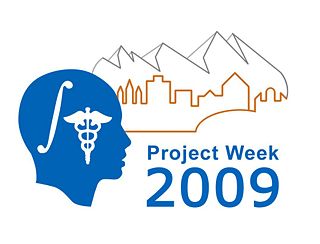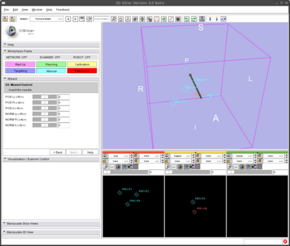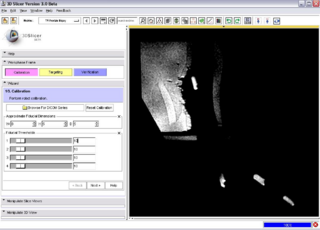2008 Winter Project Week:Robotic Prostate Interventions
 Return to 2008_Winter_Project_Week |
|
Key Investigators
- PI: Gabor Fichtinger, Queen's University
- Co-I: Purang Abolmaesumi, Queen's University
- Queen's University: David Gobbi, Siddharth Vikal
- Johns Hopkins University: Csaba Csoma
- BWH: Nobuhiko Hata, Junichi Tokuda
- NA-MIC: Katie Hayes
- GeorgiaTech: Allen Tannenbaum
Objective
The Queen’s/Hopkins team is developing novel devices and procedures for cancer interventions, including biopsy and therapies.
Our objective is to create an application for MRI Guided Transrectal Prostate Biopsy based partially on the Brachytherapy Needle Positioning Robot Integration started in June 2007 Project Week.
Approach, Plan
- Develop a workflow-based GUI for MRI-guided transrectal biopsy
- Utilize KWWidgets workflow widget engine (already in Slicer)
- Reuse some parts of the transperineal prostate robot module
- Add second-monitor full-screen interventional view to slicer
Progress
February 2008 Post-AHM Update
Work continues on the transrectal prostate biopsy module (pictured above). The OpenIGTLink reference implementation is now in svn and comes with build instructions. At BWH it has been used to transfer real-time MR images, while at JHU work on an implementation for the transperineal robot is underway. The second-monitor display functionality project for Slicer is planned to be done once the transrectal module is complete.
Winter 2008 Project Week
During this Project Week, we created the GUI for the Trans-Rectal Prostate Biopsy module and developed an OpenIGTLink tracker/robot <-> Slicer communication protocol together with Kitware (Luis) and the BWH IGT group. Continuing the transperineal module work, we are successfully doing transferring real-time MR image transfer to third-party software.
June 2007 Project Week
During the 2007 MIT Project Week, we designed the major components and protocols required for transperineal intervention with the BMW group.

